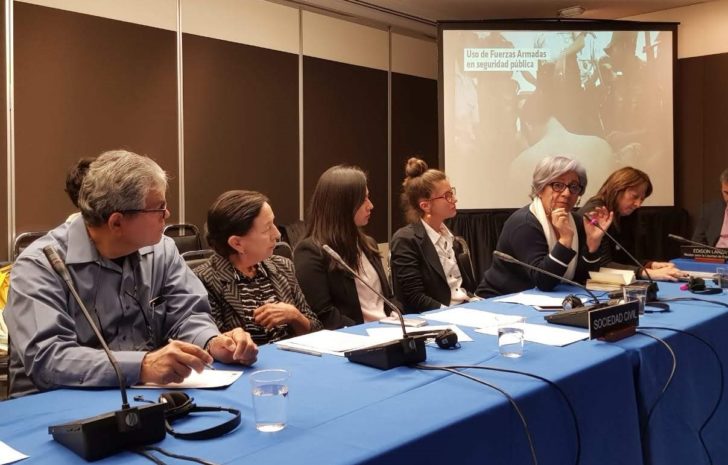In the countries of the Americas, militarization has driven violence levels higher and sparked human rights violations by state forces, including extrajudicial executions, enforced disappearances, the occupation of poor neighborhoods, and torture. At the same time, it has failed to achieve its purported goal of lowering crime rates, participants in a regional hearing at the IACHR sustained.
“This hearing is historic because it maps out one of the region’s main challenges,” commissioner Flávia Piovesan said. In a context of “internal war” – whether against drug trafficking, terrorism or another of the so-called new threats to security – states advance with hardline policies and militarization proposals that endanger human rights in the region. Policies that favor impunity and undermine rights, such as the increased use of military tribunals, are promoted under the guise of fighting crime. “We are witnessing a return of the national security doctrine in the region,” said Paulo Abrão, the IACHR’s executive secretary.
Meanwhile, commissioner Luis Ernesto Vargas Silva said “there are presidents in the region who think that the scenario in which military operations take place is open field for them to carry out certain orders. Shoot first and inquire later, shoot first and ask later. And that is extremely grave.” Finally, commissioner Antonia Urrejola indicated that the challenge lies not only in working with states but also with members of society, who want responses to their security demands.
The Commission committed itself to keeping this issue “permanently on the agenda” and to working on a concrete plan of action to confront it in a systematic way.
The organizations participating in the hearing were from 11 countries: Argentina, Brazil, Chile, Colombia, Ecuador, Guatemala, Honduras, Mexico, Peru, the United States and Venezuela. They discussed overall trends as well as the military intervention of Rio de Janeiro, the proposal to create a National Guard in Mexico, the militarization of the US-Mexico border, and the impact of militarization in Honduras.
The speakers also underlined the impunity that characterizes violations committed in the context of armed forces’ participation in security matters. The case of Jorge Parral in Mexico is emblematic: he was killed by military forces and his body was disappeared. His mother, Alicia Rabadán, explained to the members of the IACHR: “We are here today because we are part of a tragedy that extends throughout Mexico, caused by the presence and street operations of the military forces, which have no respect for human life.”

